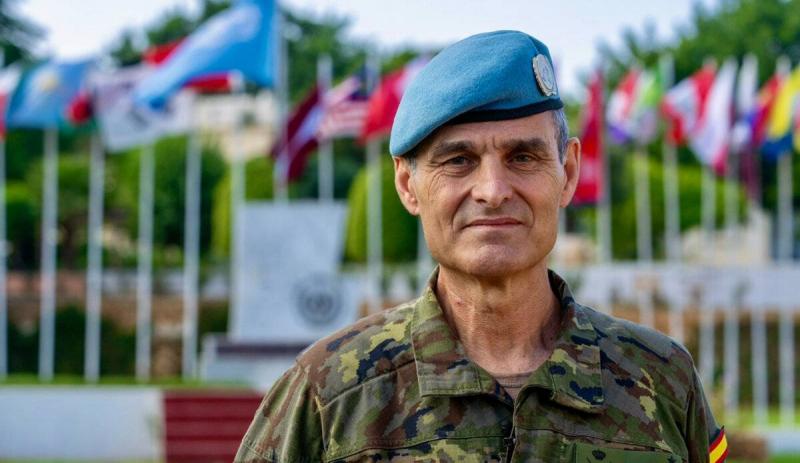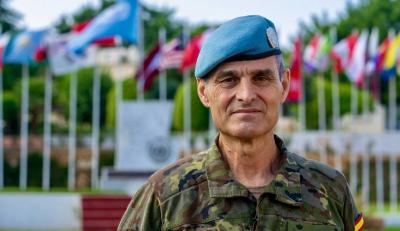Ten days ago, the commander of the International Forces operating in southern Lebanon, Spanish General Arnaldo Lazaro, and Deputy Head of the International Mission Hervé Lucocq visited Israel to meet with enemy generals and some foreign ambassadors in a reconnaissance visit, following their last visit at the end of last winter. This visit comes about a month before the renewal of UNIFIL troops during the UN General Assembly in New York, following an atmosphere of near-tension between the international forces and the occupying forces, especially given the ongoing objections from the enemy regarding the forces' performance, particularly since the outbreak of war, as reported by "Al-Akhbar."
In the visit prior to the last one, Lazaro returned to Beirut with aggressive impressions regarding the occupying army's intentions toward Lebanon after Israeli officials deliberately threatened to pressure the commander of the forces, in turn pressuring the Lebanese government, and intimidating the international forces to take escalatory steps against the resistance in the south. However, this was also accompanied by reassurances of a preference for a diplomatic solution with Lebanon over the option of open war.
As for the initial impression returned by the Spanish commander in the visit last weekend, according to sources familiar with the atmosphere of the visit, it was more positive in terms of the enemy leaders reducing the rhetoric of threats and warnings toward Lebanon. According to information, the enemy leaders repeated that they wished for a diplomatic solution with Lebanon to facilitate the return of settlers who were forced to leave northern settlements due to the resistance's strikes and to implement Resolution 1701, refusing to return to the situation prior to October 7 regarding the presence of resistance forces south of the Litani River and refusing to halt air incursions, confirming that the enemy entity is ready to launch a war on Lebanon to push Hezbollah away from the south of the Litani River if diplomatic solutions do not yield results.
Despite repeating traditional old positions, the rhetoric of the enemy leaders appeared more rational regarding confirming that there is no decision for war against Lebanon aside from all public intimidation, and emphasizing the necessity of reaching a solution through diplomatic means without raising the level of threats. According to sources, the reasons for this relative calm are the fatigue experienced by the occupying army following months of war on two fronts—Lebanon and Gaza—along with American pressures.
However, official sources in the international forces refused to comment on the official discussions of the visit, asserting that the actions of the international forces commander are not negotiations but discussions with the parties to inquire about what UNIFIL can do to stop hostilities between both sides, and that the official negotiation task is undertaken by the American side. Regarding the renewal of international forces, Western sources indicated that the Israeli leaders did not show objection to extending UNIFIL's mission without attempting to introduce amendments to the resolution text, especially since there is difficulty in making amendments in addition to a lack of a clear assessment of what will happen in the coming months as long as the battle in Gaza remains open.
While it is expected that this week there will be a change in the French general, the Chief of Staff of UNIFIL, to another French general, as well as a change of the German admiral commanding the naval forces in UNIFIL to another German admiral, discussions have begun about appointing a replacement for the current Spanish commander whose term ends next January. As usual after the term of the Spanish commander, the Italians are looking to regain command of international forces by actively promoting their candidate, who is likely to be a former commander of the western sector. Sources state that Italy, through its leadership of UNIFIL at this stage, seeks to develop its influence in Lebanon and compete with the French, similar to what is occurring in certain African regions where French influence is receding.
Undoubtedly, Spain’s position regarding Israel has complicated General Lazaro's relationship with the occupying army, exposing him to several criticisms regarding his performance in the south from representatives of the occupation in the United Nations merely to pressure Spain. He is also facing criticism in Lebanon due to provocations by some international forces in the south against the local population. Compared to the tensions that accompanied the term of the previous Italian commander Del Col, Lazaro's term, despite all the violence and escalating military operations, appears calmer in terms of how the international forces deal with events and promote a calming atmosphere, not to imply that the international forces have the ability to influence widely, but at least strive to reduce escalation according to "Al-Akhbar."




